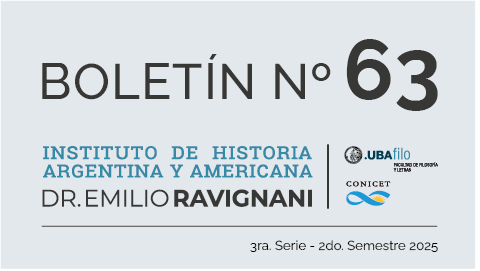How to domesticate a concept?
On Civilización. Historia de un concepto by José Emilio Burucúa
Abstract
The publication of Civilización. Historia de un concepto by José Emilio Burucúa marks a turning in Argentine historiography. Not only is this an unprecedented historical research for our scientific field, but, by inverting the usual conditions in which the idea of otherness is understood, the author forges a new concept of civilisation and, at the same time, offers a vast panorama of its conceptual itinerary through the most diverse cultural areas. However, this work also aims to take a political and intellectual stance on a phenomenon that has always been very sensitive to his historiography. After a brief comparative exercise with the English historian Eileen Power’s conception of the High Middle Ages and her political militancy before the outbreak of the Total War, we will try to find some points in common with Burucúa’s work and other differences in order to analyse the way in which the author dialogues with different historiographical traditions.Downloads
References
Berg, M. (1996). A Woman in History. Eileen Power, 1889-1940. Cambridge: Cambridge University Press.
Bermejo Barrera, J. C. (1987). El final de la historia. Ensayos de historia teórica. Madrid: Akal.
Blumenberg, H. (2003). Paradigmas para una metaforología. Traducción del alemán por Jorge Pérez de Tudela Velasco. Madrid: Trotta.
Burucúa, J. E. (1993). Sabios y marmitones. Una Aproximación al problema de la modernidad clásica. Buenos Aires: Lugar Editorial.
Burucúa, J. E. (1999). “Prólogo”. En J. E. Burucúa (dir.). Nueva Historia Argentina. Arte, sociedad y política I. Buenos Aires: Sudamericana, pp. 11-43.
Burucúa, J. E. (2001). Corderos y elefantes. La sacralidad y la risa en la modernidad clásica, siglos XV a XVII. Buenos Aires: Miño y Dávila.
Burucúa, J. E. (2023). Senegal & Aurora. Casilda: Driblin.
Burucúa, J. E. (2024). Civilización. Historia de un concepto. Buenos Aires: Fondo de Cultura Eco-nómica.
Cassin, B., dir. (2018). Vocabulario de las filosofías occidentales. Diccionario de los intraducibles. México: Siglo XXI.
Chakrabarty, D. (2008). Al margen de Europa. Pensamiento poscolonial y diferencia histórica. Traducción del inglés por Alberto E. Álvarez y Araceli Maira. Barcelona: Tusquets.
Charle, Ch. y D. Roche, eds. (2018). L’Europe. Encyclopédie historique. Paris: Actes Sud.
Curtius, E.-R. (1941). Essai sur la France. Traducción del alemán por J. Benoist-Méchin. Paris: Grasset.
Devroey, J.-P. (2012) Introduction. En E. Power. Gens du Moyen Âge. Six croquis de la vie ordinaire. Bruselas: Université de Bruxelles.
Eagleton, T. (2016). Esperanza sin optimismo. Traducción del inglés por Belén Urrutia. Buenos Aires: Taurus.
Ferguson, N. (2012). Civilización. Occidente y el resto. Traducción del inglés por Francisco José Ramos Mena. Barcelona: Debate.
Goberna Falque, J. R. (1999). Civilización. Historia de una idea. Santiago de Compostela: Servicio de Publicaciones e Intercambio Científico de la Universidade de Santiago de Compostela, 1999.
Lepenies, W. (2008). La seducción de la cultura en la historia alemana. Traducción del alemán por Jaime Blanco Castiñeyra. Madrid: Akal.
Momigliano, A. (1984). La historiografía griega. Traducción del italiano por José Martínez Gázquez. Barcelona: Crítica.
Montaigne (2007). Les Essais. Edición establecida por Jean Balsamo, Michel Magnien y Catherine Magnien-Simonin. Paris: Gallimard, “Bibliothèque de La Pléiade”.
Montaldo, G. (1999). Ficciones culturales y fábulas de identidad en América Latina. Rosario: Beatriz Viterbo Editora.
Morris, I. (2018). ¿Por qué manda Occidente... por ahora? Las pautas del pasado y lo que revelan sobre nuestro futuro. Traducción del inglés por Joan Eloi Roca. Barcelona: Ático de Libros.
Ordine, N. (2013). La utilidad de lo inútil. Manifiesto. Traducción del italiano por Jordi Bayod. Barcelona: Acantilado.
Owens, P. (2025). “Power’s World. Internayional Relations as World Social and Economic Histo-ry”. En Erased. A History of International Thought Without Men. New Jersey: Princeton University Press, pp. 109-135.
Pagden, A., ed. (2000). Facing Each Other. The World’s Perception of Europe and Europe’s Per-ception of the World. Aldershot: Ashgate/Variorum, 2 vols.
Pocock, J. G. A. (1999-2015). Barbarism and Religion. Cambridge: Cambridge University Press, 6 vols.
Power, E. (1963). Medieval People. New York: Barnes & Noble.
Rorty, R. (1996). Objetividad, relativismo y verdad. Escritos filosóficos I. Traducción del inglés por Jorge Vigil Rubio. Barcelona: Paidós.
Sarmiento, D. F. (1993). Viajes por Europa, África i América, 1845-1847. Edición crítica de Javier Fernández (ccord.). Santiago de Chile: Editorial Universitaria, “Archivos”.
Sennett, R. (2009). El artesano. Traducción del inglés por Marco Aurelio Galmarini. Barcelona: Anagrama.
Wickham, Ch. (2009). Una nueva historia de la Alta Edad Media. Europa y el mundo mediterrá-neo, 400-800. Traducción del inglés por Tomás Fernández Aúz y Beatriz Eguibar. Barcelona: Crítica.
Copyright (c) 2025 Boletín del Instituto de Historia Argentina y Americana Dr. Emilio Ravignani

This work is licensed under a Creative Commons Attribution-NonCommercial 4.0 International License.
The copyright is transferred to the Boletín, but the authors may retrieve them and reproduce their work in other media or formats by means of a written request to the Editorial Committee. In such cases, the Boletín will be cited as the first publication of the work.
The works are licensed under a Creative Commons Attribution-NonCommercial 4.0 International License, which allows others to share the work with an acknowledgment of their authorship and initial publication in this journal.
Also, by written request to the Editorial Committee of the Boletín, the authors may separately establish additional agreements for the non-exclusive distribution of the version of the work published in this journal (for example, placing it in an institutional repository or publishing it in a book), with an acknowledgement of its initial publication here. No commercial uses are allowed.



















